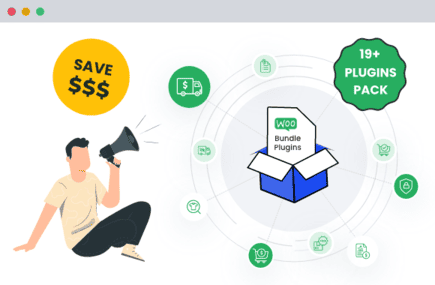Table of Contents
In today’s digital age, establishing a robust online presence is essential for businesses to thrive.
Ecommerce platforms have transformed the landscape of retail, enabling companies to sell products and services online, reach a broader audience, and significantly increase their revenue. With countless ecommerce platforms available, selecting the right one can feel overwhelming.
Are you considering starting your own ecommerce store or upgrading your existing one? If so, you’ve likely encountered two of the most popular options: WooCommerce and Shopify.
Each platform offers unique features and advantages, but choosing the best fit for your business requires careful consideration.
In this article, we’ll explore the key differences between WooCommerce and Shopify, highlighting their features and complexities to help you make an informed decision. Let’s dive into the world of ecommerce platforms and find out which one is best for you.
What is an eCommerce Platform?
An ecommerce platform is a comprehensive software solution that empowers businesses to create and manage their online stores. These platforms come equipped with a variety of features and tools designed to facilitate the online selling process.
Key functionalities include website design, product management, payment processing, and shipping integration.
Ecommerce platforms can be either hosted or self-hosted, offering varying degrees of customization to meet the unique requirements of different businesses.
Whether you’re looking to launch a small online store or scale a large ecommerce operation, these platforms provide the necessary infrastructure to sell online effectively.
Choosing the Right eCommerce Solution
Selecting the right ecommerce solution is pivotal to the success of your online business. With numerous options available, it’s important to evaluate your business needs, budget, and technical expertise before making a decision. Here are some critical factors to consider:
Scalability: Ensure the platform can handle large volumes of traffic and sales as your business grows.
Customizability: Look for a platform that can be tailored to meet your specific business needs.
Integration: Check if the platform can seamlessly integrate with other tools and services you use.
Security: Verify that the platform is secure and PCI compliant to protect your customers’ data.
Support: Consider the level of support offered by the platform, including customer service and technical assistance.
By carefully considering these factors, you can choose an ecommerce solution that aligns with your business goals and sets you up for long-term success.
Understanding Your Business Needs
Before diving into the selection process, it’s essential to have a clear understanding of your business needs. Ask yourself the following questions:
What type of products or services do you sell?
Who is your target audience?
What are your sales goals?
Do you need to integrate with other tools and services?
What is your budget?
By answering these questions, you can gain a better understanding of your requirements and narrow down the list of potential ecommerce platforms that will best support your business objectives.
Types of eCommerce Platforms
There are several types of ecommerce platforms available, each catering to different business needs and technical expertise levels:
Hosted eCommerce Platforms: These cloud-based platforms require no technical expertise and are easy to set up. Examples include Shopify and BigCommerce. They are ideal for businesses looking for a hassle-free solution to launch their online stores quickly.
Self-Hosted eCommerce Platforms: These platforms require technical knowledge and offer greater customization. Examples include WooCommerce and OpenCart. They are suitable for businesses that need more control over their ecommerce website and are comfortable managing technical aspects.
Open-Source eCommerce Platforms: These platforms are free and open-source, allowing for extensive customization. Examples include Magento and PrestaShop. They are perfect for businesses with specific needs and the technical capability to modify the platform.
Headless eCommerce Platforms: These platforms provide a flexible and customizable solution for businesses aiming to create a unique online shopping experience. Examples include Commercetools and Adobe Commerce. They decouple the frontend and backend, offering unparalleled flexibility in design and functionality.
By understanding the different types of ecommerce platforms and their unique features, you can make an informed decision and choose the right ecommerce solution that aligns with your business needs and goals.
Is WooCommerce Right for Me? Or Shopify? The Age-Old Question for Aspiring Online Entrepreneurs
If you’re launching a web store or managing an eCommerce business, you’ve likely pondered: Is WooCommerce the right choice for me? Or should I go with Shopify?
When considering whether WooCommerce or Shopify is the right choice for your online store, it’s essential to understand their fundamental differences.
WooCommerce is a WordPress plugin that transforms a WordPress site into an e-commerce store, whereas Shopify is a standalone platform designed specifically for e-commerce.
Here’s a quick overview of both platforms to help you better understand their key features and differences:
- WooCommerce: An open-source plugin for WordPress that provides unlimited customization and control over your online store. With over 6.2 million users, it’s favored for its flexibility.

- Shopify: A user-friendly, standalone platform with a monthly fee and a commission on sales, making it ideal for beginners who prefer ease of setup and management. Shopify has a significant user base of over 4 million.

Both WooCommerce and Shopify are excellent options for starting or managing an online business. Each platform offers a variety of eCommerce features designed to cater to different business needs, including customizable templates, payment processing, and inventory management.
When to Choose Shopify
- New to Online Business: If you’re a beginner and want to minimize the time spent learning.
- Limited Time and Products: If you have a small inventory and need to get started quickly.
- Less Interest in Technical Details: If you prefer a platform that requires minimal technical know-how, including SEO.
In these cases, Shopify might be the best fit for your business.
When to Choose WooCommerce
- Desire for a Professional Site: If you want a highly customizable and professional-looking website.
- Existing Website: If you already have a website and want to expand it with eCommerce functionality.
- Focus on SEO and Ownership: If you want better SEO capabilities and complete ownership of your store.
WooCommerce could be the ideal choice in these scenarios.
This is not to say Shopify can’t help you grow your online store, but many websites are continually choosing WooCommerce for good reasons.
Our reasonable suggestion is to take up the 14-day free trial that Shopify offers and/or spend a few hours daily for two weeks exploring WooCommerce to experience them for yourself. Both are top-tier e-commerce builders in the market, and there are reasons why they’re at the top.
Final Thoughts
Choosing the right e-commerce platform is vital for your online business’s success. WooCommerce offers flexibility and customization for those comfortable with website management, while Shopify provides an intuitive, all-in-one solution for hassle-free setup.
Your decision should reflect your specific needs, technical skills, and long-term goals. Take the time to explore both platforms and evaluate their features. Regardless of your choice, both WooCommerce and Shopify equip you with the necessary tools to build and grow a thriving online store. With the right platform, you’re on your way to achieving your e-commerce aspirations.
FAQs about WooCommerce vs. Shopify
Here are answers to some of the most frequently asked questions about Shopify and WooCommerce.
How is WooCommerce different from Shopify?
Shopify is a fully hosted eCommerce platform, that provides software, website hosting, backups, security, and maintenance. In contrast, WooCommerce is a self-hosted WordPress plugin, that requires you to manage hosting, domain registration, and website maintenance yourself. Both platforms allow you to sell products online and manage inventory effectively.
Which eCommerce platform is more flexible?
WooCommerce is generally more flexible due to its extensive library of extensions and themes. It can support both a blog and an eCommerce store, making it versatile for various business needs. Additionally, it easily integrates with multiple email platforms and SEO tools for optimized performance.
Can I use Shopify with WordPress?
Yes, you can use the Shopify Starter Plan with WordPress by adding Shopify’s Buy Now button. However, this may complicate the user experience, as it redirects users to the Shopify cart for checkout. For a seamless integration, consider using WooCommerce with WordPress.
Which eCommerce platform is best for small businesses?
WooCommerce is often considered one of the best eCommerce platforms for small and medium-sized businesses. Its free and open-source nature, coupled with powerful features and customization options available through the WordPress ecosystem, makes it an attractive choice.
What are some alternatives to Shopify and WooCommerce?
Alternatives to Shopify include eCommerce platforms like BigCommerce, Squarespace, and Wix. For WooCommerce alternatives, consider plugins like MemberPress, WPForms, and Easy Digital Downloads.
